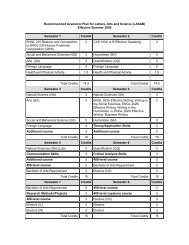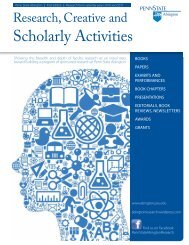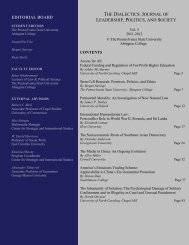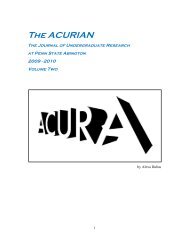Vol. III - Penn State Abington
Vol. III - Penn State Abington
Vol. III - Penn State Abington
You also want an ePaper? Increase the reach of your titles
YUMPU automatically turns print PDFs into web optimized ePapers that Google loves.
SOCIAL CAPITAL IN URBAN PUBLIC SCHOOL LEADERSHIP<br />
By Chase Nordengren ∗<br />
The Catholic University of America<br />
Urban schools in the United <strong>State</strong>s struggle amidst poverty, despair and an overall<br />
attitude of disenfranchisement. Poor performance on standardized tests, endemic violence and<br />
significant staffing issues have left urban schools the education center of last resort in the eyes of<br />
many parents, reserved only for those students too poor to afford private tuition. The breakdown<br />
in urban schools is related more fundamentally to a breakdown in the basic stabilizers in any<br />
social system: trust, transparency, and collaboration. As part of a leadership strategy, social<br />
capital can reinforce these stabilizers and thereby create fertile ground for substantive reform.<br />
The Social Capital Dynamic in School Leadership<br />
School leadership is not only administrative but inherently social and political. Goldring<br />
and Greenfield (2002, p. 3-6) identify four social characteristics unique to school leadership. The<br />
first characteristic is the need for moral agency. Where values conflict, moral agency is an<br />
essential aspect of arbitrating disputes: “in a pluralistic society ... it follows that the ends—the<br />
common good, the public interest—will, by definition, be multiple and often conflicting”<br />
(Jackson, 1995, p. 5). In education, policy disputes are frequently specific expressions of general<br />
moral principles like the right to unionize or the responsibility of the state to children. School<br />
leaders must evaluate and prioritize among these principles when actors like teachers unions,<br />
parent organizations or lawmakers place them in conflict. Second, school leaders are stewards of<br />
the public trust. School constituencies demand quality schools which provide the best outcomes<br />
for their children while not advocating for specifics; school leaders make significant policy<br />
decisions in their place. When schools produce a “poor product,” their essential role in children's<br />
lives draws a unique level of criticism from the public (Jackson, 1995, p. 3). Third, school<br />
leadership is unique because of the complexity of teaching and administration, made particularly<br />
intense with the increased attention to pedagogy applied in the last twenty years. School leaders<br />
must define what makes a good teacher or what curricula prepare students for the modern<br />
economy where answers to these questions are inconclusive, contradictory and constantly<br />
evolving. The most important characteristic of school leadership, however, is the highly peopleintensive<br />
character of education delivery. School leaders are “people working with and through<br />
people to influence people” (Goldring and Greenfield, 2002, p. 6), subject to the will of the<br />
people. Although all local administration is to a certain extent social, school leaders are expected<br />
to balance running a bureaucracy, pleasing taxpayers and legislators, and caring for a<br />
constituency of the young and dependent.<br />
∗ Chase Nordengren is an undergraduate at the Catholic University of America, where<br />
he is studying politics, philosophy and religion. He is interested in building<br />
sustainable, just and well-reasoned social policy, focused particularly on human<br />
capital development. Chase is the 2007 undergraduate winner of the Brookings<br />
Institution Hamilton Project’s Economic Policy Innovation Prize for his research work<br />
in rural health care provider retention.<br />
THE DIALECTICS ▲ 2009<br />
www.abington.psu.edu/dialectics<br />
20







